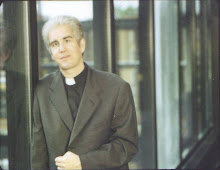I have been haunted of late by something I said some years
ago:
It hit me as I was overseeing the annual James Kenneth
Echols preaching competition at the Lutheran School of Theology at Chicago,
again as I wrote letters of recommendation for students applying for The David
H.C. Read Preacher/Scholar Award competition, and last week and this week as I
write for Good Preacher, the lectionary commentary of The Festival of
Homiletics. I have my face buried in exegesis while the “great preachers”—and
the list is really great—are gathered in Atlanta. I did the same thing last
year, and agreed to write again, just because I feared my negative reaction was
“sour grapes” over not being regarded as a “great preacher” by the Festival of
Homiletics, and taking ribbing for it.
It’s not sour grapes. My wife, who watches as I write and
write and write and finally asks why I am doing this, reminded me of that. The
friend who emailed the link to this You Tube video and invited me to take heed
of my own words also reminded me. And taking a look at my own teaching of
preaching, both in Master of Divinity Programs at LSTC and Notre Dame, and the
ACTS Doctor of Ministry in Preaching Program, also reminded me. Bottom
Line: “I don’t teach or
approach preaching as a competitive sport!” We collaborate in class, workshop among peers, logjam in my
office and at http://craigasatterlee.com. An asset of the ACTS Preaching
Program is that it’s not competitive—though every so often, a student or two
try to make it that way.
I am, frankly, confounded as I try to find objective
criteria with which to determine who wins LSTC’s preaching competition or what
makes a preacher “great.” A graduating senior recently told me he was glad to
hear that our preaching competition was not my idea, and that I do my best to
downplay its competitive aspect by declaring the real winner to be the
listeners and the congregations the competitors will one day serve.
Nevertheless, LSTC’s preaching competition will continue, and I am responsible
for it. If students undertake the $20,000 Read Preaching/Scholar Award, I will
write them letters of recommendation. But I will step away from writing for the
Festival of Homiletics. I know the editor of “Preaching Helps” in Currents in Theology and Mission, and
suspect he’d let me write.
Somewhere in her chapter “Preaching” in The Preaching Life, Barbara Brown Taylor debunks best and worst
sermons. Every semester, I read those passages to my students before they
preach their first sermons in class. For me, today, what makes Barbara Brown Taylor “great”
is her insight.

No comments:
Post a Comment